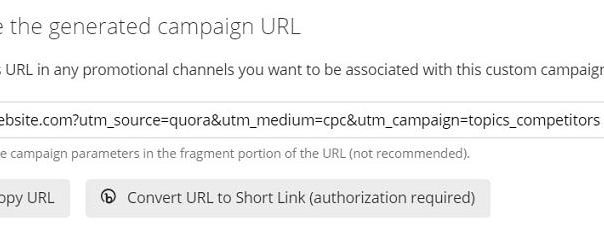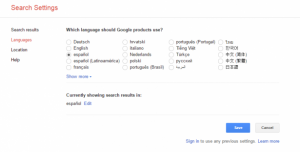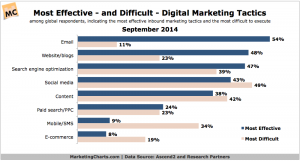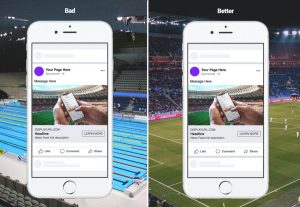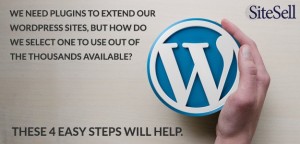It still boggles my mind how many PPC marketers say they have not even tried Quora yet. Yes, more channels may mean more work, but shouldn’t we be doing everything we can to help our clients stay in front of their target audience? Isn’t it always worth it to test out new marketing channels to lower our CPAs? The answer should be “yes” to both of those questions—so why not try Quora?
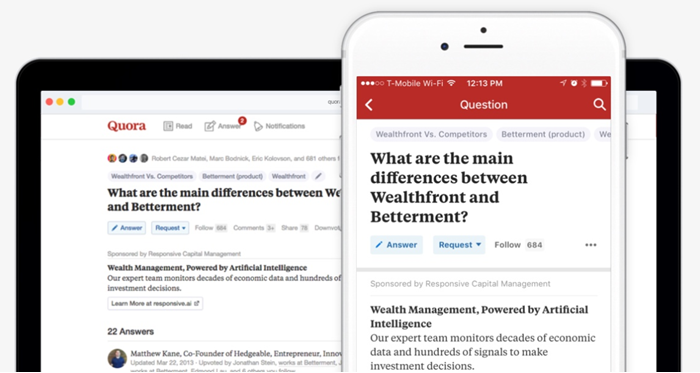
Now, you don’t want to add another channel just for the sake of using another channel. That’s not really a cross-platform strategy. You want to add a channel that will complement your PPC strategy on your existing channels and, in some cases, make it even more effective. With that in mind, I want to go over three key reasons you need to consider adding Quora to improve your PPC strategy.
Reason #1: Your target audience is probably on Quora
One thing has been the same from the day I got into the Quora Ads beta until today: Advertisers can sign up for Quora, add the pixel to their website (or clients’ websites), and start collecting audiences without ever having to give Quora any credit card information. I love this feature for one big reason. I get clients all the time tell me something along the lines of, “My audience is not on Quora. We do not need to be advertising there.” Then I convince them to at least set up the account. I install the pixel for them and go back with this…

Would you really want to ignore 1.4 million visitors in the buyer’s journey in the past six months? No way. This evidence is important when considering your marketing strategy.
This is especially important because I’m starting to see images like this more and more in my clients’ Google Analytics accounts.

We are starting to see longer conversion paths in Google Analytics. Now a user’s paths may be the same length as it always was, but we can track more touch points now as we expand our marketing efforts into other channels. And we can start to see the impact of staying in front of users has on our conversions. I’ve written before about the Google Display Network’s single biggest benefit: brand awareness. This is one of Quora’s biggest benefits, too. While I get plenty of direct conversions from Quora (a lot cheaper than some other paid channels, I might add), I also get a lot of assisted conversions, too. If people are not ready to convert yet when they see my ad on Quora, at least I am staying on top of their minds to influence them to convert later on via any of my other channels.
Reason #2: You can target that audience for less on Quora
Let me go through a fun, hypothetical scenario here. While this scenario may be made up, I have used this exact tactic for many of my clients. Why? Because it flat out just works. Okay, so let’s begin. Let’s say my client is in the SaaS industry, and their product is perfect for anyone who works in email marketing.
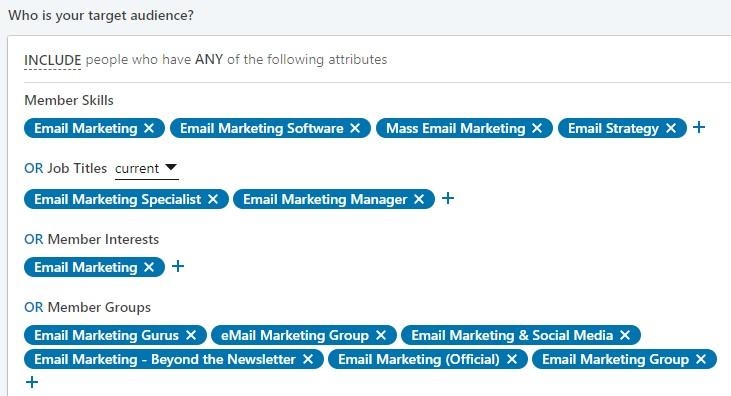
Now, in the image above, I looked at Member Skills, Member Interests, Member Groups, and Job Titles all related to email marketing on LinkedIn. No matter how I structured the campaign targeting (either all options layered together using the AND/OR feature or just focused on one targeting attribute at a time), the lowest I could get the CPC was $ 6.43 when targeting just the United States. Most of the time the CPC hit the $ 7.14 mark.
For an awareness campaign, especially for a company with a smaller budget, this may be tough to swallow. I may need to find new ways to reach these users. That is when I am going to pop into Quora and see what options I have there.
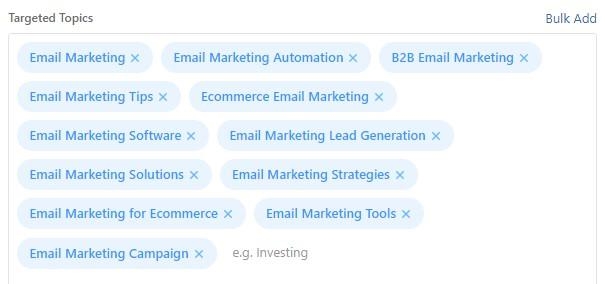
In Quora, I can target as deep as the question level. This means I can place ads on any specific question I choose. While that may be appealing, the volume may not be there. So in the example image above, I chose to stick with topics related to the email marketing that are available to target within Quora. I did not choose all the available options to be clear. I only chose the ones that were suggested to me. Now, let’s see what the CPC range is for the exact topics I have selected in the previous image.

Another part I absolutely love about Quora is the CPC transparency. When looking at what CPC to enter, Quora gives the advertiser a range. In this case, with the email marketing topics I chose, the CPC range is $ 0.68 to $ 2.58. Quora gives you the actual lowest to highest bid ranges from other advertisers bidding on these topics. This really helps you understand your place on the channel. Bidding higher will help you enter more auctions. This could lead to a higher CTR, which would lower the actual CPC anyway. And even if I wanted to max out my bid at the $ 2.58, it is still a bid that is almost 60% cheaper than what I would have to pay on LinkedIn.
Now, you may be thinking, “Wait a minute Joe. The targeting options between all of these channels are completely different.” You are definitely correct with that statement, but that is not the point I am trying to make. The point is most likely you are going to use these channels anyway to try and reach your target audience. And if one channel is noticeably expensive right off the bat, why don’t you try driving a lot more affordable traffic with Quora first. If you are not hitting the reach you would like to achieve, then use the remaining budget to the more expensive channels.
Also, if it is not a budget issue to run campaigns on multiple platforms, then by all means do so! I am not saying you must choose try one channel first before moving on to the other. Running both at the same time can be great when they’re complementary. But not all businesses have the budget to use every desired channel. So if you are limited by budgets in any way, why not start with the channel that has the lowest CPCs, but can still offer you a steady stream of very qualified users?
Reason #3: You can use Quora’s targeting to build remarketing audiences
The same client I talked about with the email marketing campaign above also wanted to target their competitors on Facebook and LinkedIn. This client wanted to target users interested in MailChimp, Zoho, Constant Contact, SendX, Ontraport, and many more. We did find a lot of relevant competitor member groups in LinkedIn with low CPCs, but Facebook proved to be more difficult. Not all of the competitors were available in Facebook as interest categories to target. But with Quora…
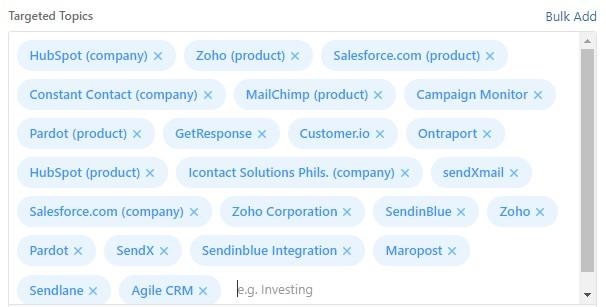
…we could find every single one of them as topics to target. This means our ads could appear on any question and answer that were categorized under any of these competitor topics. Now, we’re getting in front of users who are actively researching or discussing my competitors. That is relevant traffic we may not be able to find on the other social platforms.
I also like to keep in mind that users looking at my competitor topics may not be familiar with my brand. They also may be in the beginning phases of their research and might not be ready to convert right away. And that’s okay! I do not want to force a “sign up now” message to users if they are not ready to convert. I would rather nurture these leads. And we can do this with Quora just like our other channels.

By making sure you are using tagged URLs in your Quora Ads, you can start creating website visitor audiences in your other PPC channels. So if the other paid advertising channels do not have the targeting options you want, but Quora does, you’ll be able to create a remarketing campaign in Facebook, LinkedIn, or Google Display based off the traffic coming from the specific campaign you originally tested in Quora. This allows you to create a multi-channel strategy to not only find the right user, but stay in front of them on multiple channels until they are ready to convert. You see how we can use Quora not to replace any of he other channels but to enhance the performance and reach of the other channels we may be using talready.
Enhance your cross-platform PPC strategy with Quora marketing
You shouldn’t stop using Google Ads, Facebook, Instagram, or LinkedIn. But to say your audience is only on a few channels is just not true. That’s why you should look to other channels to complete your cross-platform marketing strategy—other channels like Quora.
Here’s a recap of the three biggest reasons to add Qora to your cross-platform PPC strategy:
- Your target audience is probably on Quora
- You can target that audience for less on Quora
- You can use Quora’s targeting to build remarketing audiences
You can use Quora to not only stay in front of current users but also find new users to target to build more awareness and product interest—all for less money than you’d spend on your other marketing channels. If you haven’t given Quora a try yet and you consider yourself a multi-channel strategist, it’s time to get started!
Digital & Social Articles on Business 2 Community
(48)
Report Post